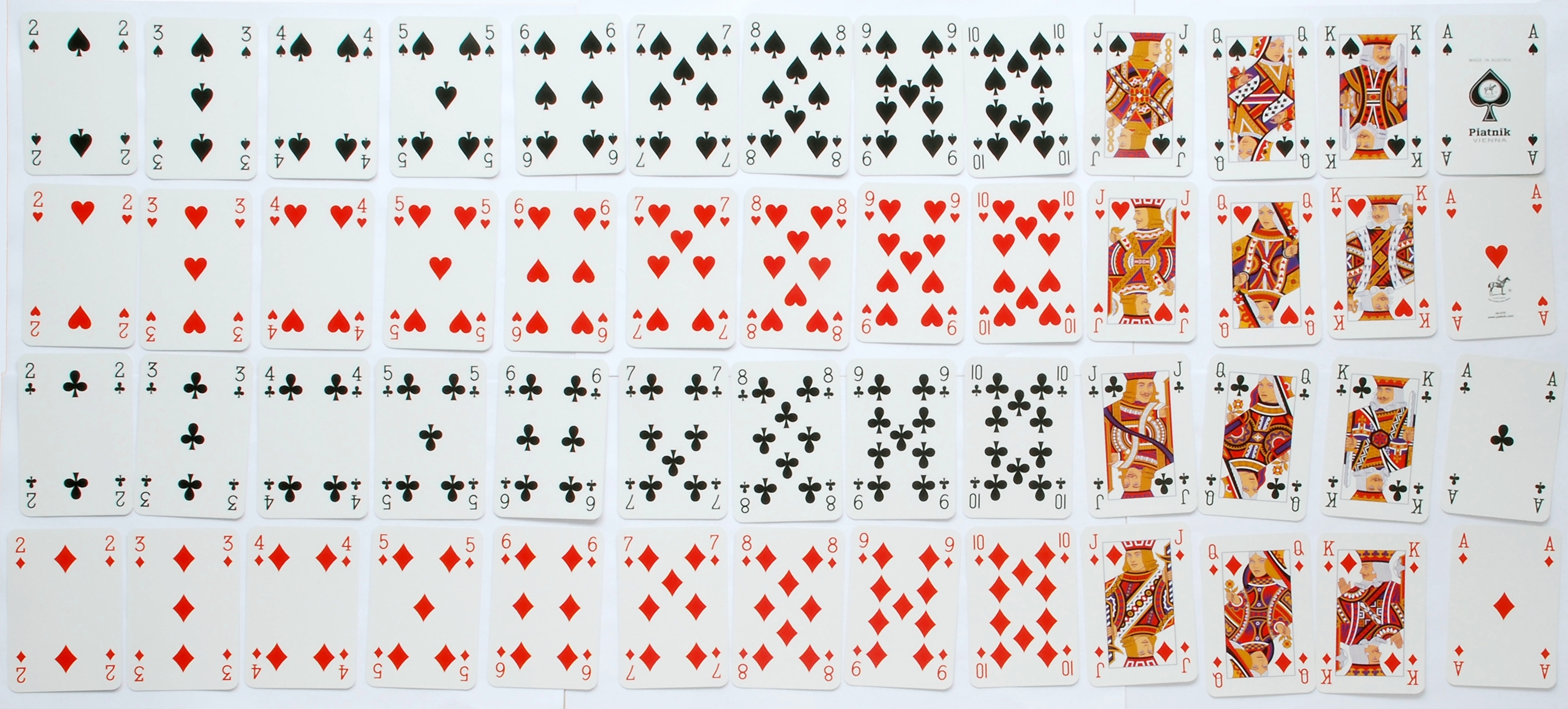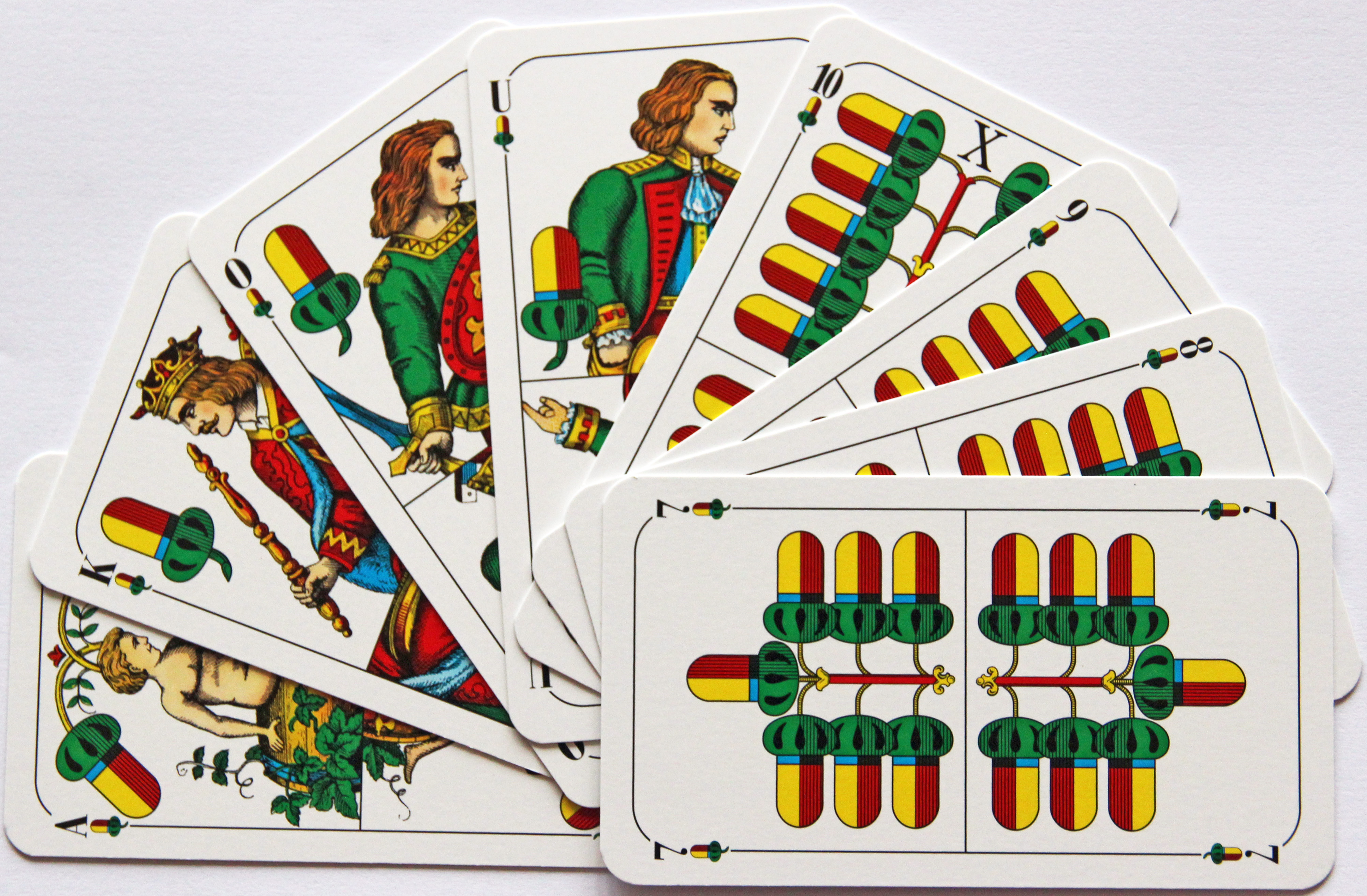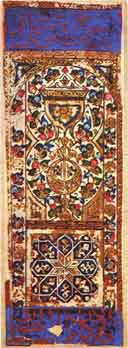|
Six-bid Solo
Six-bid solo, six bid solo or just six-bid for short, is a trick-taking, card game from the western United States for 3 players and is often associated with Salt Lake City. It is a member of the German Tarok group of games that originated in an attempt to play a tarot card game with standard, non-tarot cards. Six-bid solo itself is a variant of frog, a game very similar to south German Tapp, the Swabian version of German Tarok. History The origins of six-bid solo lie with an old south German game called German Tarok (''Deutschtarok'') which arose in the desire to play the tarot card game of Grosstarock with German-suited, non-tarot cards. German Tarok appeared in the late 18th century and became very popular in Württemberg, Swabia and Bavaria during the 19th century. One offshoot was the game of Tapp, played in Württemberg and Swabia, which was essentially German Tarok with French-suited cards. It may have been Tapp that was brought to the United States by European emigra ... [...More Info...] [...Related Items...] OR: [Wikipedia] [Google] [Baidu] |
Trick-taking
A trick-taking game is a card game, card- or tile-based game in which play of a ''Hand (card games), hand'' centers on a series of finite rounds or units of play, called ''tricks'', which are each evaluated to determine a winner or ''taker'' of that trick. The object of such games then may be closely tied to the number of tricks taken, as in plain-trick games such as contract bridge, whist, and Spades (card game), spades, or to the value of the cards contained in taken tricks, as in point-trick games such as pinochle, the Tarot card games, tarot family, briscola, and most evasion games like Hearts (card game), hearts. Trick-and-draw games are trick-taking games in which the players can fill up their hands after each trick. In most variants, players are free to play any card into a trick in the first phase of the game, but must ''follow suit'' as soon as the stock is depleted. Trick-avoidance games like reversis or Polignac (card game), polignac are those in which the aim is to a ... [...More Info...] [...Related Items...] OR: [Wikipedia] [Google] [Baidu] |
French-suited Cards
French-suited playing cards or French-suited cards are cards that use the French suits of (clovers or clubs ), (tiles or diamonds ), (hearts ), and (pikes or spades ). Each suit contains three or four face/court cards. In a standard 52-card deck these are the ( knave or jack), the ( lady or queen), and the (king). In addition, in Tarot packs, there is a (knight) ranking between the queen and the jack. Aside from these aspects, decks can include a wide variety of regional and national patterns, which often have different deck sizes. In comparison to Spanish, Italian, German, and Swiss playing cards, French cards are the most widespread due to the geopolitical, commercial, and cultural influence of France, the United Kingdom, and the United States in the 19th and 20th centuries. Other reasons for their popularity were the simplicity of the suit insignia, which simplifies mass production, and the popularity of whist and contract bridge. The English ... [...More Info...] [...Related Items...] OR: [Wikipedia] [Google] [Baidu] |
Pass (cards)
The following is a glossary of terms used in card games. Besides the terms listed here, there are thousands of common and uncommon slang terms. Terms in this glossary should not be game-specific (e.g. specific to Bridge (card game), bridge, Hearts (card game), hearts, Poker (card game), poker or rummy), but apply to a wide range of card games played with non-proprietary packs. It should not include terms solely related to casino or banking games. For glossaries that relate primarily to one game or family of similar games, see #Game-specific glossaries, Game-specific glossaries. A ; ace # The card with one pip in a pack of cards. Usually the highest card of a #suit, suit, #rank, ranking immediately above the #King, king. May also occupy the lowest rank. # Commonly refers to the #deuce, Deuce or Two in #German-suited pack, German-suited packs which don't have real Aces. Often the highest card of a suit. ; Acorns (card suit), acorns : One of the four #suit, suits in a #German ... [...More Info...] [...Related Items...] OR: [Wikipedia] [Google] [Baidu] |
Hand (cards)
A card game is any game that uses playing cards as the primary device with which the game is played, whether the cards are of a traditional design or specifically created for the game (proprietary). Countless card games exist, including families of related games (such as poker). A small number of card games played with traditional decks have formally standardized rules with international tournaments being held, but most are folk games whose rules may vary by region, culture, location or from circle to circle. Traditional card games are played with a ''deck'' or ''pack'' of playing cards which are identical in size and shape. Each card has two sides, the ''face'' and the ''back''. Normally the backs of the cards are indistinguishable. The faces of the cards may all be unique, or there can be duplicates. The composition of a deck is known to each player. In some cases several decks are shuffled together to form a single ''pack'' or ''shoe''. Modern card games usually have bespo ... [...More Info...] [...Related Items...] OR: [Wikipedia] [Google] [Baidu] |
Widow (cards)
In card games, a talon (; French for "heel") is a stack of undealt cards that is placed on the table to be used during the game. Depending on the game or region, they may also be referred to as the blind, kitty, skat, stock, tapp or widow (US). Description In 1909, Meyers Lexicon described the talon as ''"the cards left over after dealing..."'' In games of chance, such as Pharo, it is ''"the stock of cards which the banker draws on"''. The talon is usually a pack of cards, placed face down, in the middle of the card table. In other games, there are however very different variations, for example in Königrufen. Talons may be placed face up or face down. Parlett describes a ''kitty'' as "the pool or pot being played for" or "a dead hand or widow". He also equates ''talon'' to ''stock'' as the "cards which are not dealt initially but may be drawn from or dealt out later in the play".Parlett, David. ''The Penguin Book of Card Games''. London: Penguin (2008), p. 642-646. . Exampl ... [...More Info...] [...Related Items...] OR: [Wikipedia] [Google] [Baidu] |
Eldest Hand
Card players are those participating in a Card game#Hands, rounds and games, card game. Various names are given to card players based on their role or position. Position Games of Anglo-American origin In games of Anglo-American origin played in English-speaking countries, age refers to the order of priority in which players make the first lead, bid or bet, based on their position at the table.''The Language of Cards'' at www.parlettgames.uk. Retrieved 4 August 2018 This changes constantly as the dealer rotates either clockwise or anticlockwise around the table. They are traditionally referred to as follows: ; Eldest hand (or elder hand): the player who enjoys greatest priority and e.g. is the first to receive cards in the deal. Elder is the non-dealer in two-hand games. ; Youngest hand (or younger han ... [...More Info...] [...Related Items...] OR: [Wikipedia] [Google] [Baidu] |
Packet (cards)
The following is a glossary of terms used in card games. Besides the terms listed here, there are thousands of common and uncommon slang terms. Terms in this glossary should not be game-specific (e.g. specific to bridge, hearts, poker or rummy), but apply to a wide range of card games played with non-proprietary packs. It should not include terms solely related to casino or banking games. For glossaries that relate primarily to one game or family of similar games, see Game-specific glossaries. A ; ace # The card with one pip in a pack of cards. Usually the highest card of a suit, ranking immediately above the king. May also occupy the lowest rank. # Commonly refers to the Deuce or Two in German-suited packs which don't have real Aces. Often the highest card of a suit. ; acorns : One of the four suits in a German-suited pack of cards. Symbol: ; active # A card that is in play i.e. not sleeping. # See active player. ; active player # A player who receives cards ... [...More Info...] [...Related Items...] OR: [Wikipedia] [Google] [Baidu] |
Cut (cards)
In card games, to cut the cards (also "cut the deck" or "cut the pack") is to split the deck into two packets by lifting one packet from the top and placing it face down next to the remaining cards beneath it. The lower packet is then placed on top of it. This is typically done after the cards have already been shuffled, and the procedure is used just prior to the cards being dealt to the players. The aim of this is to reduce the possibility of cheating, for example, by knowing the top or bottom card. Cutting the cards is also a common way of determining the seating order at a card table, the partnerships or the first dealer. Purpose The practice of cutting is primarily a method of reducing the likelihood of someone cheating by manipulating the order of cards to gain an advantage. Even if the dealer (or the shuffler, if they are not the dealer) does not plan on cheating, cutting will prevent suspicions, thus many rules require it. Some players also consider the cut to be luc ... [...More Info...] [...Related Items...] OR: [Wikipedia] [Google] [Baidu] |
Dealer (card Player)
Card players are those participating in a card game. Various names are given to card players based on their role or position. Position Games of Anglo-American origin In games of Anglo-American origin played in English-speaking countries, age refers to the order of priority in which players make the first lead, bid or bet, based on their position at the table.''The Language of Cards'' at www.parlettgames.uk. Retrieved 4 August 2018 This changes constantly as the dealer rotates either clockwise or anticlockwise around the table. They are traditionally referred to as follows: ; Eldest hand (or elder hand): the player who enjoys greatest priority and e.g. is the first to receive cards in the deal. Elder is the non-dealer in two-hand games. ; Youngest hand (or younger hand): the player who has the lowest p ... [...More Info...] [...Related Items...] OR: [Wikipedia] [Google] [Baidu] |
Play (cards)
The following is a glossary of terms used in card games. Besides the terms listed here, there are thousands of common and uncommon slang terms. Terms in this glossary should not be game-specific (e.g. specific to Bridge (card game), bridge, Hearts (card game), hearts, Poker (card game), poker or rummy), but apply to a wide range of card games played with non-proprietary packs. It should not include terms solely related to casino or banking games. For glossaries that relate primarily to one game or family of similar games, see #Game-specific glossaries, Game-specific glossaries. A ; ace # The card with one pip in a pack of cards. Usually the highest card of a #suit, suit, #rank, ranking immediately above the #King, king. May also occupy the lowest rank. # Commonly refers to the #deuce, Deuce or Two in #German-suited pack, German-suited packs which don't have real Aces. Often the highest card of a suit. ; Acorns (card suit), acorns : One of the four #suit, suits in a #German ... [...More Info...] [...Related Items...] OR: [Wikipedia] [Google] [Baidu] |
Deal (cards)
A card game is any game that uses playing cards as the primary device with which the game is played, whether the cards are of a traditional design or specifically created for the game (proprietary). Countless card games exist, including families of related games (such as poker). A small number of card games played with traditional decks have formally standardized rules with international tournaments being held, but most are folk games whose rules may vary by region, culture, location or from circle to circle. Traditional card games are played with a ''deck'' or ''pack'' of playing cards which are identical in size and shape. Each card has two sides, the ''face'' and the ''back''. Normally the backs of the cards are indistinguishable. The faces of the cards may all be unique, or there can be duplicates. The composition of a deck is known to each player. In some cases several decks are shuffled together to form a single ''pack'' or ''shoe''. Modern card games usually have bespo ... [...More Info...] [...Related Items...] OR: [Wikipedia] [Google] [Baidu] |









